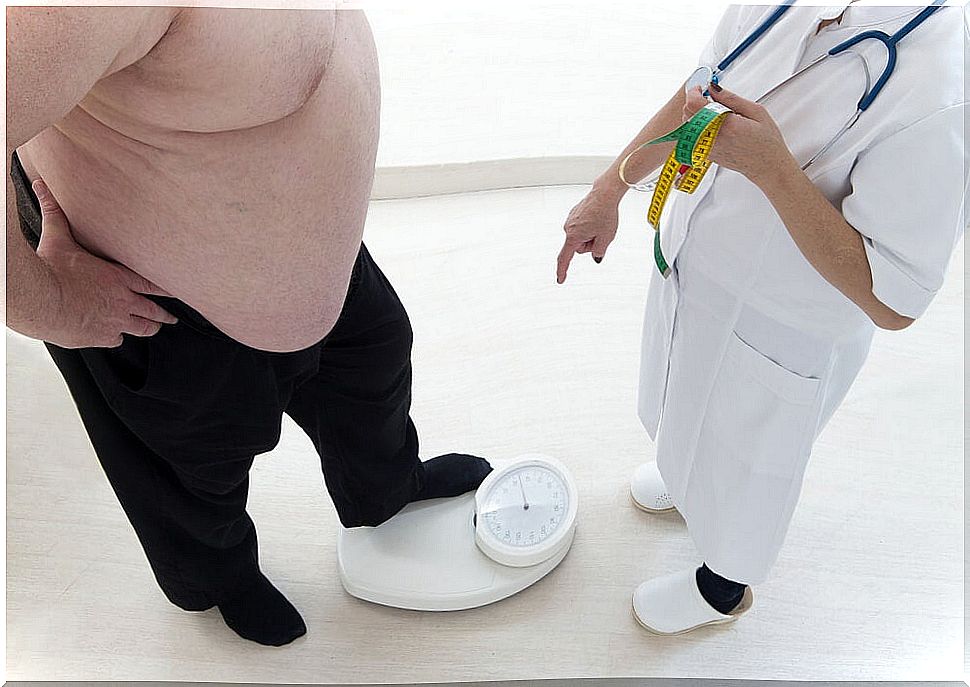Xenical: An Anti-obesity Drug
Xenical is an anti-obesity drug whose active substance is orlistat. This active principle exerts its effect, reducing absorption by 30% of the fats that are ingested with meals.
How does Xenical work?
Xenical is a drug that works by absorbing fats from meals but does not affect appetite, as do other types of drugs indicated to treat obesity.
The fats that we incorporate with our meals are dissolved by the action of enzymes called lipases. This medicine exerts its action on them, avoiding the absorption of fats in one part. As a consequence of this action, the 30% of ingested fats in food are eliminated unmetabolized in the stool.
Due to its mechanism of action , Xenical helps to lose weight and helps to keep it off over time. It can also improve some cardiovascular risk factors, such as high blood pressure, high levels of cholesterol and glucose in the blood.
Indications of Xenical

This medicine is indicated in obese people, with a body mass index (BMI) equal to or greater than 30 kg / m2. However, t It is also an option in the case of overweight patients whose BMI is equal to or greater than 28 kg / m2, provided that in addition to being overweight, they have associated risk factors.
If after three months of treatment with orlistat it is not possible to lose at least 5% of the initial weight, it is necessary to abandon and stop taking Xenical.
Read also: Depression and obesity: Is there a genetic relationship?
How is Xenical taken?
The usual dose in adults is 120 mg, taking it immediately before, during or up to one hour after each main meal.
According to studies carried out on orlistat, the main route of elimination is via fecal excretion. Almost 100% of the Xenical dose it is eliminated with the faeces unchanged. The effect of this drug causes an appreciable increase in fecal fat after 24-48 hours.
When you start treatment with Xenical, you should also follow a balanced and moderately hypocaloric diet . The diet must contain a daily intake of fats, carbohydrates and proteins distributed among the three main meals of the day .
When is the use of Xenical not indicated?
Like all medications, orlistat has some contraindications, including the following:
- Allergy : you cannot take orlistat if you are allergic to it or to any of the components of the drug.
- Malabsorption syndrome.
- Children.
- Lactation.
In obese patients who also present liver and / or kidney disorders, as well as in the elderly and children, there are no studies on the effect of this drug.

Does it interfere with other medications?
Xenical has some interactions with other drugs, and they are due to the fact that it modifies the absorption of certain active ingredients, leading to changes in their effect.
Sometimes, very rarely, hypothyroidism with thyroid abnormalities can occur. This effect can occur as a consequence of orlistat decreasing the absorption of iodine salts or levothyroxine.
Additionally, Xenical decreases the absorption of antiepileptic drugs, which can lead to seizures. It also reduces the absorption of fat-soluble vitamins such as vitamin E and beta-carotene. For this reason, while you are taking this drug, they may advise you to take a vitamin supplement. However, it is important to maintain a good balance in the diet, and it must be especially rich in fruit and vegetables.
On the other hand, Xenical enhances the effect of some medications that are used to lower the cholesterol level. Therefore, for patients, it may be necessary to readjust the dose of cholesterol treatment.
If you are taking contraceptives, to prevent possible failures, which could occur if you suffer from severe diarrhea due to the effect of orlistat, they will recommend that you additionally use a barrier method of contraception.
Conclution
Xenical helps to lose weight and maintain it, but also contributes to improving cholesterol levels, as well as reducing other cardiovascular risk factors.
However, it is essential to maintain a hypocaloric diet during treatment, as well as to perform physical exercise on a regular basis. If in doubt, consult your doctor or pharmacist.









